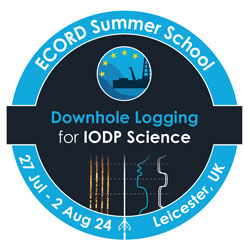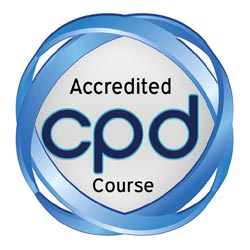International Ocean Discovery Program
ECORD Summer School: Downhole Logging for IODP Science, 27 July to 2 August 2024
 We are happy to announce that the eight ECORD Summer School: Downhole Logging for IODP Science will take place at the University of Leicester.
We are happy to announce that the eight ECORD Summer School: Downhole Logging for IODP Science will take place at the University of Leicester.
Our Summer School introduces the interpretation and applications of downhole logs and physical property data primarily from the International Ocean Discovery Program (IODP). The course explores the relevance and unique insights of these data for a range of fields, including paleoclimatology, sedimentology, hydrogeology, and broader geological and ecological processes such as sediment provenance and water column productivity.
The Summer School is open to applicants from all career stages and geoscience backgrounds. However, the course is tailored for individuals who:
- are early in their career and/or would like to introduce and make use of more physical properties data in their research and/or;
- would like to get more involved in IODP in some capacity, either through accessing and using data or sailing on an IODP research expedition.
Introductory sessions on petrophysics, the study of the physical (and chemical) properties of rocks and their interactions with fluids, are at the heart of the Summer School. These core principles are then used for insight into broader marine geoscience questions and environments through practical exercises and presentations that provide experience of interpreting downhole logging data and integrating them with other datasets based on real world science applications.
Participants will gain insight into:
- Offshore logging planning and operations
- Core physical properties and measurement techniques
- Data processing and data quality assessment
- Scientific log interpretation
- Applications of downhole logging and petrophysics
The 2024 ECORD Summer School: Downhole Logging for IODP Science will take place in person 27 July to 2 August 2024 at the University of Leicester. The participation fee is £195.
What is petrophysics and downhole logging?
 Petrophysics is the study of the physical (and chemical) properties of rocks and their interactions with fluids. Petrophysical data acquisition operates principally by sending tools below the seafloor. In the borehole, logging tools measure a range of properties, capturing continuous data under in situ conditions.
Petrophysics is the study of the physical (and chemical) properties of rocks and their interactions with fluids. Petrophysical data acquisition operates principally by sending tools below the seafloor. In the borehole, logging tools measure a range of properties, capturing continuous data under in situ conditions.
Capturing the in-situ information, relevant to the formation and the fluid it contains, is important for generating and calibrating geological models. Well log data provide a resolution at the 0.1-100 metre scale and are widely used to link core through physical properties measured on the core itself to seismic profiles.
There is a petrophysics skills shortage within IODP and within the geoscience industry. The Summer School aims to address this through the provision of accessible and affordable training to geoscientists who wish to understand more about petrophysics in order to make greater use of downhole log and physical property data in their research.
The key aim of the Summer School is to equip course attendees with a working knowledge of downhole logging and core physical properties data. This means developing the skills to assess data quality and usability in any given geological interpretation/setting and an understanding of how to analyse the data to enhance their research.
Schedule
The 7-day Summer School encompasses 30 hours of CDP-accredited training in petrophysics. The school will include a mixture of interactive lectures, workshops, group projects, exercises, and a field trip. Participants will be introduced to basic data processing and data quality assessment, applications of downhole logging and petrophysics and are able to share their own research during a designated poster session (and yes, there will be a prize for best poster!).
Application
Application deadline
- 8 April 2024 11.59pm BST
Email your application to epc@leicester.ac.uk. The application must include:
- completed application form
- letter of motivation (maximum 2 pages including letterhead) highlighting:
- your current project and
- how you plan to use downhole-logging and physical properties data in your future research, and
- how your interests and expertise connect to IODP
- 1-page resume
- letter of support from your supervisor (if you are an undergraduate, graduate or PhD student).
Please ensure, that your application is complete, on time, and follows the guidelines outlined above. Due to the generally large volume of applications, the ones not adhering to the guidelines will be rejected outright.
Applications will be accepted until 8 April 2024 11.59pm BST. A panel selected from the organizer and lecturer pool will then evaluate the applications. We anticipate to invite 30 participants to join the in-person summer school. Applicants will be notified of the outcome of their application in early April.
Download the application form (docx., 307kb)
Note for US-affiliated applicants
US affiliated students and researchers may apply to USSSP for travel support, with a limited number of travel grants available. USSSP will be circulating an announcement about applications for these travel grants soon. Find further information on the USSSP site.
Note for ANZIC-affiliated applicants
Australia and New Zealand applicants, please send your applications to both EPC (epc@leicester.ac.uk) and the ANZIC Office (iodp.administrator@anu.edu.au) by 8 April 2024.
Australian and New Zealand IODP Consortium (ANZIC) will cover the travel cost and course participation fee for the 2024 Downhole Logging for IODP Science Summer School for some accepted Australian and New Zealand participants. Eligible participants must have received an invitation from EPC to attend. Please inquire with the ANZIC Office (iodp.administrator@anu.edu.au) on how to apply for support.
Note for ECORD-affiliated applicants
The European Consortium for Ocean Research Drilling (ECORD) may sponsor scholarships to allow outstanding young scientists to attend. Each scholarship contributes to costs of registration, travel, subsistence and/or accommodation at the summer school. Information about available grands and how to apply can be found here: Get a scholarship - ECORD: European Consortium for Ocean Research Drilling.